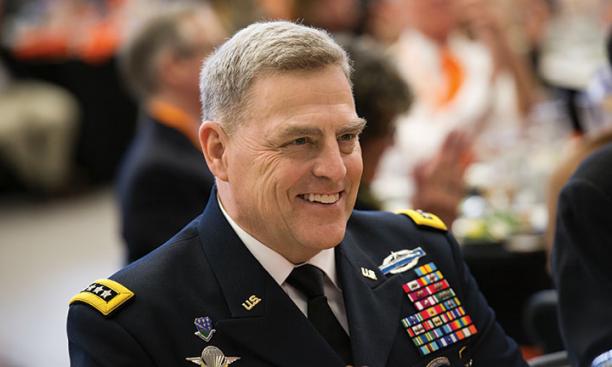
Gen. Mark Milley ’80, the 39th chief of staff of the U.S. Army, received the Woodrow Wilson Award at Alumni Day. Milley, who previously served as commanding general of the U.S. Army Forces Command, spoke with PAW about Ivy League graduates serving in the military and the challenges the Army faces around the world.
Is there a cultural divide between the military and Ivy League universities?
It’s as much a geographic issue. The Army demographic is heavily weighted toward the Mountain West, the Midwest, the Deep South, and the Southwest. The two coasts are numerically underrepresented. As we move further into this century, the requirement for very technologically sophisticated, highly adaptive people is going to grow, and we’re missing out on the two parts of the country with very high education levels.
I would like to see more students from the Ivy League serve; I think it’s healthy for the country. On the other hand, I think it’s overstated how few Ivy League graduates there are. It’s that people don’t know who they are.
What is the Army’s role in NATO today?
Europe is a difficult situation. Russia has been conducting a very aggressive foreign policy. It indicates that a fundamentally different Russia has emerged.
Thucydides wrote that wars are caused by fear, pride, and interest. Russia has a longstanding fear of land invasion, which their politicians exploit. Then there’s pride — Russia’s status fell during the Cold War, and they want to get it back. Finally, there’s a huge amount of financial interest because Russia is the gas tank of Europe.
I testified not too long ago that Russia was our No. 1 military threat. I define a threat as capability plus intent. The Russians clearly have a nuclear capability. Their conventional capability atrophied, but they have resurrected it over the last several years. So what is their intent? That is much more difficult to figure out. But you can guess based on their behavior, and their behavior has clearly been aggressive. From our standpoint, the fundamental task is to assure our allies that NATO is still strong and the United States is resolute in order to deter Russia from further aggression. I think the Army can play a key role in that.
What sort of military do we need?
We have to decide what we, the people of the United States, want to see as the role of America in the world. That’s a fundamental question that needs to be addressed. If we see ourselves as a global power and responsible for maintaining the rules that were set at the end of World War II, if we still use words like “indispensable nation,” then how are you going to do it, and with what tools? You’re going to need a large military with an extensive capacity across the range of operations. You have to be able to deal with natural disasters, riots, homeland defense, counterterrorism, insurgencies, and conventional war. A president has to have options that cover a wide range of potential contingencies over the entire globe.
Most countries are dealing with a single geographic space and a single type of enemy. That’s not true for the United States. We could find our military in any geography, in any type of weather conditions, so we need a military that is flexible, adaptive, and agile. That’s a big challenge.
Interview conducted and condensed by Mark F. Bernstein ’83
